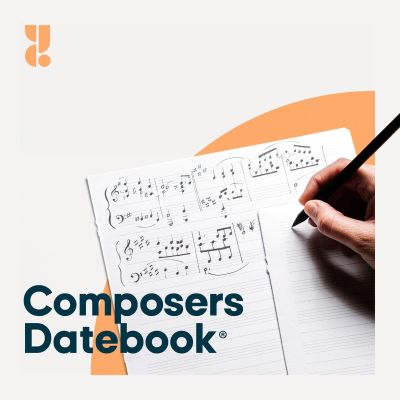Composers Datebook™ is a daily two-minute program designed to inform, engage, and entertain listeners with timely information about composers of the past and present. Each program notes significant or intriguing musical events involving composers of the past and present, with appropriate and accessible music related to each.
Gesamtlänge aller Episoden: 3 days 20 hours 58 minutes
Edison, for the record
Some have claimed that it was on today’s date in 1877 that the American inventor Thomas Edison recorded his own voice reciting, “Mary had a little lamb” on a tin-foil cylinder of his own design. Other historians date the precise birth of the phonograph earlier, others later. In any case, the Edison Speaking Phonograph Company wasn’t established until January of 1878...
Johann Strauss in Salzburg (and Vienna)
As the proverbial saying goes: “Necessity is the mother of invention.” It was, frankly, a matter of ECONOMIC necessity that led a 36-year-old Austrian conductor named Clemens Krauss to program an all-Johann Strauss concert by the Vienna Philharmonic at the Salzburg Music Festival on today’s date in 1929. The Festival was established in 1920 with high ideals but insecure funding. To succeed, the Festival needed both strong local support and wealthy visitors from abroad...
William Henry Fry
On today’s date in 1813, William Henry Fry was born in Philadelphia. As a journalist, he was one of the most vociferous champions of American concert music, and put his money where his mouth was by becoming a composer himself, creating a number of programmatic works, including a “Niagara” symphony and another titled “Santa Claus.” Above all else, Fry was passionate about opera, and wrote several of his own. Fry was a colorful—if understandably biased—music critic...
Morning Revisited by Raksin
OK, if your dad wrote music for silent movies and you want to write music yourself, does that increase the odds you’ll end up a film composer, too? That was the case with David Raksin, who was born in Philadelphia in 1912, and who died in Los Angeles on today’s date in 2004. When he was 23, Raksin moved to Hollywood to help Charlie Chaplin arrange Chaplin’s own music for the film, ''Modern Times,'' and stayed on in Hollywood, working without credit on dozens of B-rated films...
Poulenc's "Model Animals"
Just about ANY time is a good time to be in Paris, but chances are, given your druthers, you wouldn’t have chosen to be there in 1942. The city was occupied by German troops, and World War II had several more dismal years to grind on...
Ellen Taaffe Zwilich's Quintet
Performers need composers and composers need performers. And some performers really like composers–and vice versa. That seems to be the case with the Kalichstein-Laredo-Robinson Trio, comprised of Joseph Kalichstein, piano; Jaime Laredo, violin; and Sharon Robinson, cello, and the Pulitzer Prize-winning American composer Ellen Taaffe Zwilich...
Rebecca Clarke
In 1942, the 19th Festival of the International Society for Contemporary Music was held in Berkeley, California. Over 30 composers from 13 nations were represented. All of them were male–with one exception. On today’s date, the “Prelude, Allegro, and Pastorale” for clarinet and viola written by Rebecca Clarke was premiered at the Festival. Clarke was born in England, in 1886, to an American father and a German mother...
Musgrave's Postcard
On today’s date in 2012, at the Royal Albert Hall in London, the BBC’s SCOTTISH Symphony, under the direction of SCOTTISH conductor Donald Runnicles, gave the world premiere of a new orchestral piece by the SCOTTISH composer Thea Musgrave. You might be forgiven for asking, “Were any bagpipes involved?” No, but the piece did involve the next best thing¬–¬if you’re Scottish that is–namely the Loch Ness monster...
William Schuman, Chairman of the Board
By the time of his death in 1998, pop singer Frank Sinatra was such a domineering figure in his field that he was known as “The Chairman of the Board.” By the time of HIS death in 1992, the same nickname might have applied to the American composer William Schuman, who was, at various times, director of publications for G. Schirmer, president of the Juilliard School, president of Lincoln Center, and on the board of many other important American musical institutions...
Salieri opens La Scala
On today’s date in 1778, Italy’s most famous opera house opened with a performance of “L’Europa riconosciuta,” or “Europa revealed,” a work written specially for the occasion by Antonio Salieri. The new theater took its name from its location, previously occupied by the church of Santa Maria della Scala, which in turn was named after a Milanese nobelman’s wife, Beatrice della Scala...
